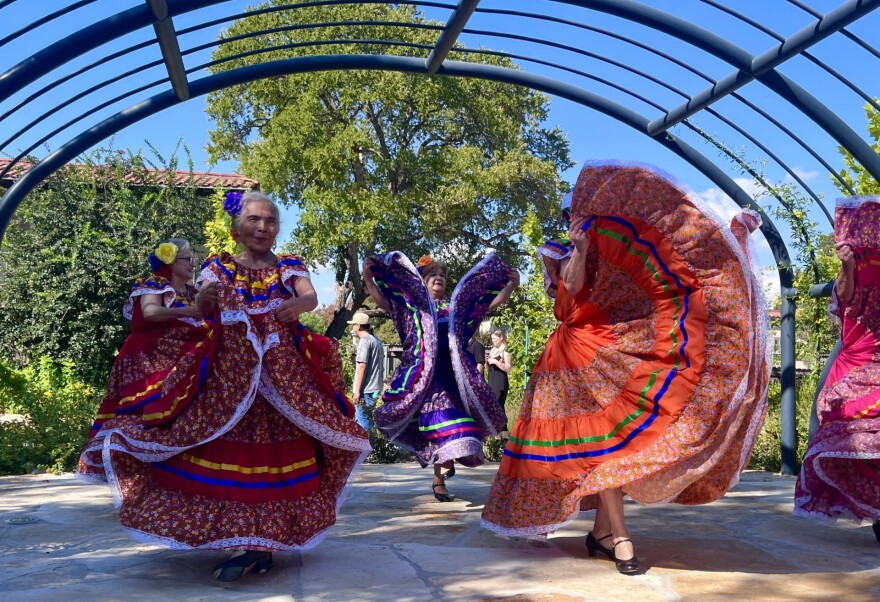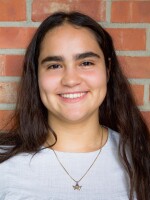Sign up for TPR Today, Texas Public Radio's newsletter that brings our top stories to your inbox each morning.
In San Antonio, Texas, Latina grandmothers in their 70s and 80s formed a folklórico dance troupe known as Las Abuelitas De Oro, a name inspired by the popular sitcom "The Golden Girls."
Ballet folklórico is a traditional Mexican dance that combines regional dance with the techniques of ballet. It's an elaborate, intricate dance form, involving footwork and skirt movements, or "faldeo."
On a bright Sunday morning at a city park in Texas, Las Abuelitas De Oro elegantly grab their long, vibrant, Sinaloan dresses and sway them as they dance to a set of traditional Mexican songs in front of a few dozen people.

Las Abuelitas de Oro gained popularity in San Antonio because despite their older age, they can impressively dance over extended periods of time with enthusiasm and joy.
The women have no interest in hiding their age; they celebrate the fact that they are able to perform and share their culture.
“I always like it when they call out the age. They say, 'we've got our group here from 73 to 86,' and you can hear the gasps in the audience,” 73-year-old dancer Michelle McDonald said. “I love that. I love that, yes, they need to know that we're fortunately blessed, that we can perform, that we can move like we do.”
McDonald was born in Cuba and raised in Texas. Her journey with dancing began at seven when she learned ballet, jazz and flamenco. She stopped dancing after her career as a dental hygienist, marriage, and raising a son took priority. After retirement, she took on folklórico.
Sandra Rodriguez, stopped dancing after high school. She worked in banking, married, and raised two children. Now, at 73, she says folklórico brings her joy and helps her stay healthy.
“It helps with our coordination, with our balance, with our memory, you know, because we have to remember our steps, what's next. So it's all very good for our health,” Rodriguez said.
The group practices at least three hours every week. If any of the women need a break during practice, they sit down and observe the dance to provide feedback.
Dolores De Leon Savage is 85 years old and she’s been dancing since she was three. For decades, she owned two dance studios in the Rio Grande Valley. Now, as a retired dance teacher, she loves to apply her skills to help the Abuelitas improve their performances.
“When we perform, we just go out there and like we're teenagers, even though we're in our 80s,” Savage said. “Because, you know, yeah, we do have pains and aches and everything. But you know, when we're dancing, everything is gone.”
75-year-old Belinda Cardenas says she looks up to her older dance mates.
“I want to still be dancing at that age,” Cardenas said. “So to me, that's amazing, and I want to continue that.”

Although Las Abuelitas de Oro formed just last year, many of the ladies in the group met 15 years ago at a senior center offering folklórico dance classes. Today, there are eight women who perform and a few others who attend the weekly practices.
The group's co-sponsors, Katherine Vinton and Melissa Garza, organize their outreach to the community.
“I actually saw them when I was doing a professional development at a school. They came for like a one-off and were dancing,” Vinton said. “And I was like, oh my goodness, we need to do something to get these ladies into every single school here in San Antonio, because they're such a great example of our culture and how culture is transmitted through intergenerational experiences.”
Now, as a formal group, they offer free performances year-round throughout San Antonio. Part of their mission is to pass down their culture to newer generations by teaching folklórico to an elementary dance group known as Los Rayitos de Sol, or little sunbeams. The Abuelitas stepped in to teach students at the request of the parents who reached out to the principal asking for a ballet folklórico after-school program.
The program can build knowledge and pride about the culture through dance and help students form bonds with their classmates. When the Los Rayitos de Sol group formed last year, there were about 30 students involved, and this year that number has grown to over 75 students.

Lynette Aguilar, a parent with two daughters in Los Rayitos de Sol, shared how the program has made her daughters all the more excited to go to school.
“And so it truly is an abuelita relationship with the kids. The kids are so excited to see them. They're excited to see them dance— and also the abuelitas," Aguilar said. "It's a shared mutual relationship and adoration, because the abuelitas are so kind and caring with the kids. They help them with everything, from tying their shoes to (helping them put) on their skirts."
Some of the Abuelitas sponsor the purchase of dresses for individual kids to have the proper performance attire. One of their goals is to be able to provide all of the students with folklórico outfits.

Las Abuelitas de Oro are working on building their audience in person and on social media, and towards becoming a nonprofit to expand their impact and sustain their work.
Vinton shared that becoming a nonprofit would provide them more funding opportunities by applying for grants and attracting community sponsorships. Being a nonprofit would also allow the group to continue beyond their founding members and formalize the group's mission to preserve Mexican cultural traditions.
Los Rayitos de Sol and the Abuelitas performed at the San Antonio park to songs such as "Guadalajara" and "Jesusita en Chihuahua." The sun highlighted the dancers' vibrant Jalisco ribbon dresses and illuminated the silver details on the boys' charro suits. The crowd joined in on the fun by clapping along to the taps of the dancers' feet.
Rodriguez, who goes by Sandy, says being a part of the group has helped these women find a purpose post-retirement.
“Working with the children has been just fantastic. They're beautiful, and they're so eager to learn,” Rodriguez said. “They love to dance. And then, you know, we're showing them our culture.”
Las Abuelitas are refreshing their dance set and rehearsing to perform during Las Posadas, a Catholic tradition in Latin America commemorating Mary and Joseph’s journey to Bethlehem before the birth of Jesus.



